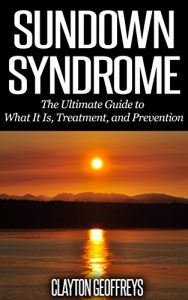Learn What Sundown Syndrome and How to Tackle It!
Read on your PC, Mac, smartphone, tablet or Kindle device!
In Sundown Syndrome: The Ultimate Guide to What It Is, Treatment, and Prevention, you'll learn all the fundamentals of Sundown Syndrome. This book covers a variety of topics regarding different stages of Alzheimer’s, how Sundown Syndrome develops, prevention techniques for Sundown Syndrome, and treatment methods. Caring for someone with Sundown Syndrome can be difficult, which is why it’s important to understand the ins and outs of the condition.
If you feel like you are developing Sundown Syndrome or are a caregiver for someone coping with Sundown Syndrome, read this book to begin your quest of better understanding and treating the condition. Grab your copy today.
Here is a preview of what is inside this book:
- Foreword
- What is Sundown Syndrome?
- How Does Sundown Syndrome Develop?
- Understanding Circadian Rhythms
- The Most Common Sundown Syndrome Symptoms
- How to Prevent Sundown Syndrome from Developing
- What Can Caregivers do to Help Cope with Sundown Syndrome?
- The 9 Actionable Steps to Treating Sundown Syndrome
- The 7 Ways to Deal with Early Onset Alzheimer’s/Dementia
- The 5 Common Drugs Used to Treat Sundown Syndrome
- Conclusion
An excerpt from the book:
Alzheimer's disease and dementia exhibit a variety of symptoms, and create challenges and issues for the spouse, other family members, and caregivers. One of those is known as Sundown Syndrome. It's also known as Sundowners, sundowning, and even by some as, "the witching hour." Sundowning is typically defined as increased confusion or anxiety as the day ends or as daylight ebbs. It coincides with the time the body grows more fatigued and tired. In fact, this phenomenon is common among not only those with dementia, but also elderly patients and residents in facilities that do not have a diagnosis of Alzheimer’s or other forms of dementia.
Sundown syndrome is also called "spontaneous agitation," and is traditionally caused by over-stimulation, fatigue, and confusion that increase insecurities, restlessness, and disorientation at nighttime. This is believed to be caused by a reduction of visual clues, noises that are familiar and comforting in the daytime, as well as decreased activity.
Tags: sundowners syndrome, sundown syndrome, Alzheimer, alzheimers, dealing with dementia, alzheimers caregivers, dementia care






